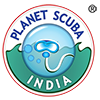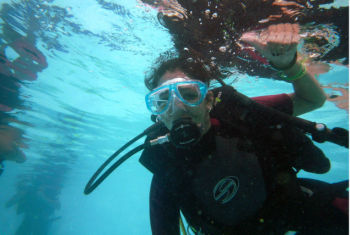Netrani is about 10 nautical miles from Murudeshwar
Bangalore: After emerging as a trendsetter in wildlife tourism in the country, the State-owned Jungle Lodges and Resorts is now planning to start a scuba diving camp near the famous Netrani Island.
A popular place for scuba diving in the country, the Netrani Island in the Arabian Sea is located about 10 nautical miles from Murudeshwar. A good destination for snorkelling and diving activities since it has a coral reef, the island boasts of a vast variety of aquatic and avian life.
“We will set up a nature camp at Apsarkonda, near Honnavar, which will act as a base camp for those coming for scuba diving,” Managing Director of JLR N.D. Tiwari, told The Hindu. Apsarakonda, incidentally, also has waterfalls also.
The JLR is planning to provide tent accommodation with about 20 to 30 beds for those undertaking scuba diving. “Scuba diving groups would be roped in to operate diving camps,” he added.
At present, the Indian Navy is using a portion of this small island for its target practise, which is being opposed by environmentalists stating that the coral reef, which is among the only few near a mainland, would be damaged. Only those with prior permission from the Indian Navy can access the island for scuba diving and snorkelling activities.
With regard to the permission from the Indian Navy, Mr. Tiwari said they would initiate talks on this issue and were hopeful of getting the permission.
The camp, he said, would commence in November. “There was a demand from the adventure enthusiasts for a scuba diving camp near the Netrani Island since it is the only place in mainland India where such opportunities can be provided.” At present, the Andaman and Nicobar Islands, and the Lakshadweep Islands offer opportunities for scuba diving, he said.
On other projects, Mr. Tiwari said the black buck resort at Vilaspur near Bidar with a 15-cottage accommodation was ready for inauguration and 15-cottage resort at Talakalale near Jog Falls would be ready by May.
Deep Diving
Mention a “deep dive” and watch the reactions. Novice diver want to know what it’s like. More experienced divers who have been a bit deeper chat with excitement. Those qualified to venture to 40 meters show enthusiasm, though somewhat tempered with respect for the challenge deep diving presents. There’s something a bit attractive, exciting and mysterious about ‘ going deep’
As a OWD 18 metres marks the depth limit to which you’re qualified to dive. This limit isn’t arbitrary it’ based on no decompression limits, nitrogen narcosis an air supply but even if you’ve only made a few dives, you may be curious about deeper dives, perhaps simply to visit specific dive sites below 18 meters.
The Deep Adventure dive will satisfy some of this curiosity and give you access to some of those dive sites by qualifying you to dive as deep as 30 meters, in conditions as good as or better than those in which you have training and experience. You can do your deep dive speciality on the up coming Maldives Dive Trip. Just sign up with us and get ready to explore the deeper side of Maldives.
Soon to a blog near you.
Well, which goes to say is this blog, but yes coming soon i will be putting up some dive specialities that one can learn and master, i will start with a few that you can do right away at our up and coming Maldives Trip. Stay tuned, Also leave a comment if you are looking for any particular specialties or want something particular to be highlighted (scuba diving related and NO! Girls in bikinis have nothing to do with scuba diving). Stay tuned avid divers.
Diving In The Maldives
Although the Maldives are known the world over for the stunning beaches and azure waters that typify the tropical idyll, its life beneath the water’s surface is becoming ever more respected by divers in the know. The Maldive Islands have some excellent coral reefs, but it’s the abundance of fish life throughout the country that sets it apart from other dive destinations.
Most diving in the Maldives is drift dives from liveaboards where you allow the current to move you along. Due to the myriad channels and passages between the atolls, the currents sweep and play throughout the island chain so that nutrients are always on the move. This accounts for the vast numbers of fish enjoying the passing feast and you can expect to see Napoleon wrasse, parrotfish, snappers, barracudas, jacks and sweetlips in every site where the water flows.
In the channels, you can explore the caves, caverns and overhangs where soft corals proliferate, and there is a riot of colourful sponges, invertebrates and gorgonian fans all profiting from the nutrient-rich water. There are also plenty of cleaning stations where cleaning wrasses and shrimps service the larger marine species.
Inside the atoll lagoons you often find pinnacles of rock vaulting up almost to the surface. These are known locally as ‘Thilas’ and are often bejewelled with sessile life forms. These formations bring water up from the ocean floor against their walls, feeding the sponges and soft corals that cling to its sides as well as creating an environment that supports a plethora of crustaceans and schools of resident fish.
Slightly removed from the reefs, you are likely to spot the pelagics that frequent the Maldives, including manta rays and eagle rays and a variety of sharks including the mighty whale shark. Wherever you look there is likely to be something of interest going on and for many it is in the shallows where the best of the action takes place. Here the clear water, brightly illuminated by the sun’s rays and playing host to great numbers of fish, provides an ideal environment both for photographers and divers alike.
During the El Niño of 1998 some shallower areas of the coral reefs have been adversely affected by bleaching. However the accepted view is that while the reefs are returning to their former colourful glory, the marine life has never dwindled and indeed many believe it has increased in numbers over the past few decades.
Bangalore Dive Club
We recently celebrated the 1st anniversary of the Bangalore Dive Club. It was a fun outing with all members coming together to create a party atmosphere. The Bangalore Dive Club has also decided to take up the cause to stop shark finning in our Indian waters. Let’s hope to see a bigger turn out for the next meeting and hopefully we can bring more attention to the cause as well. SAVE THE SHARKS! STOP FINNING
[youtube=http://www.youtube.com/watch?v=_iYK4tAsTa8]
